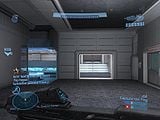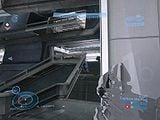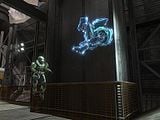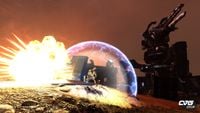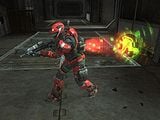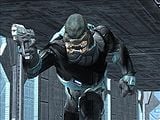Armor abilities: Difference between revisions
From Halopedia, the Halo wiki
mNo edit summary |
m (→Miscellaneous) |
||
| Line 36: | Line 36: | ||
*Armor Abilities will change form depending on whether a Elite or Spartan is using them. That is, Elite will have Armor Abilities made from purple metal, while Spartans have Armor Abilities which appear dull silver and rectangular. If a player drops an Armor Ability, it will take the form of the way it appeared on the player's back. The only exception is Evade, even if a Spartan drops it, it will still appear like a Covenant ability. This is odd as while on the Spartan's back, it can clearly be seen to share a design to other Spartan Armor Abilities (dull silver and rectangular). | *Armor Abilities will change form depending on whether a Elite or Spartan is using them. That is, Elite will have Armor Abilities made from purple metal, while Spartans have Armor Abilities which appear dull silver and rectangular. If a player drops an Armor Ability, it will take the form of the way it appeared on the player's back. The only exception is Evade, even if a Spartan drops it, it will still appear like a Covenant ability. This is odd as while on the Spartan's back, it can clearly be seen to share a design to other Spartan Armor Abilities (dull silver and rectangular). | ||
*In canon terms, the Armor Abilities have only been seen in use during the [[Fall of Reach]], due to the fact they were introduced in ''Halo: Reach'' as a gameplay element. As Reach was the UNSC's primary military complex, prototype technologies such as Armor Abilities may have been developed and tested exclusively on the planet, thus explaining their absence in the other games. In addition, other ''Halo'' games occur in the time period after Reach falls, having John-117 as the only Spartan working alongside regular UNSC forces with limited military assets due to the Fall of Reach. ''Halo: Reach'' is centered around a Spartan team on a UNSC fortress world, with support and equipment more readily available. | *In canon terms, the Armor Abilities have only been seen in use during the [[Fall of Reach]], due to the fact they were introduced in ''Halo: Reach'' as a gameplay element. As Reach was the UNSC's primary military complex, prototype technologies such as Armor Abilities may have been developed and tested exclusively on the planet, thus explaining their absence in the other games. In addition, other ''Halo'' games occur in the time period after Reach falls, having John-117 as the only Spartan working alongside regular UNSC forces with limited military assets due to the Fall of Reach. ''Halo: Reach'' is centered around a Spartan team on a UNSC fortress world, with support and equipment more readily available. | ||
*[[ | *[[NOBLE Team]] (aside from the player) can be seen sprinting or using Armor Lock without the required attachments. Likewise, [[Jiralhanae|Brutes]] and AI [[Sangheili|Elites]] use their Armor Abilities (Armor Lock or Evade) without the necessary external attachment. Brutes aren't even wearing any sort of Energy Shielding that could be supercharged with Armor Lock. | ||
*If one were to use Hologram and walk into the projection, they would notice that no matter what helmet they are wearing, the inside of the helmet of the hologram will always be the same. One can see this at the beginning of [[Noble Actual]] when Noble Six puts on his/her helmet. This was likely done to save time and resources. | *If one were to use Hologram and walk into the projection, they would notice that no matter what helmet they are wearing, the inside of the helmet of the hologram will always be the same. One can see this at the beginning of [[Noble Actual]] when Noble Six puts on his/her helmet. This was likely done to save time and resources. | ||
*There are a total of [[list of "seven" references in Halo|seven]] Armor Abilities in ''Halo: Reach'', another reference to Bungie's favorite number. | *There are a total of [[list of "seven" references in Halo|seven]] Armor Abilities in ''Halo: Reach'', another reference to Bungie's favorite number. | ||
Revision as of 13:53, August 12, 2013
Armor abilities are gameplay items featured in Halo: Reach, Halo 4 and Halo: Spartan Assault. Similar to Halo 3's equipment pieces, these items can be picked up and activated by players. Unlike Halo 3's equipment pieces however, they are reusable.
Overview
Armor abilities are a refined gameplay feature of Halo 3's equipment. Instead of being single-use, each ability is reusable, with a cooldown time between uses. In campaign, the player begins with the sprint armor ability at the start of each level, and is able to swap it with other armor abilities they may come across. In multiplayer, armor abilities can be chosen through loadouts before a match is started or during a player's respawn time. Armor abilities can be manipulated like weapons in Forge.[1]
Most armor abilities are enabled by a small device attached to the user's lower back, with each ability displaying a different color. When not in use, these devices will project a hologram that displays the icon of the ability, allowing for quick recognition from a distance or when switching abilities. When players are killed, the armor abilities will not be drop down.
All armor abilities are rendered useless to players when transporting objects such as Flags and Oddballs. If players attempt to use an armor ability, the object simply drops out of their hands. In custom games, the cooldown time can be altered and the ability to use armor abilities while holding objectives can be added.
Halo: Reach
Halo 4
Halo: Spartan Assault
Trivia
Tips
- Hologram and Active Camouflage are great armor abilities to use during Infection gametypes as hologram can confuse zombies and active camo will straight up hide from them. These work well as they, to an extent, depend on the enemy not looking hard enough, something zombies don't have time to do.
- It is often advantageous to have a teammate using the Drop Shield ability in both Firefight and standard Multiplayer modes. This is due to the fact that this ability will heal wounded teammates without wasting health packs.
- When using the Active Camouflage, try "crouch walking." This will allow the invisibility to last longer and make it harder for the opponents to see the player while he/she is still moving.
- When one's Energy Shields are low or completely depleted, use Armor Lock until the energy shields recharge as much as they can before Armor Lock de-activates. This will ensure that a sudden ambush after a battle that left the shields depleted will not overwhelm one.
- Active Camo can be useful during Generator Defense matches. While enemies are focused on the generators, one can sneak up on each one and assassinate or stick them.
- Promethean Vision is the only armor ability which can be used while carrying a detached turret. Using any other armor ability will cause the player to drop the turret.
- Armor abilities are weakened in War Games, in relativity to Campaign or Spartan Ops. This means that armor abilities have a shorter use time (Hardlight Shield, Autosentry, etc.) or have a weaker effect (thruster pack has shorter travel distance, players cannot jump while deploying the Hardlight Shield).
- In Halo: Reach, take advantage of the jammer on Active Camo. You can use it to move at top speed and get into position while the enemies that don't have line of sight on you can't be sure of what you're doing because of the jammer.
Miscellaneous
- In campaign, the player almost always starts, and can complete the level, with the Sprint Armor Ability. The only exceptions to this are in Exodus Rally Point Alpha, where a player must have a Jetpack to advance the level, and during a short sequence in the Pillar of Autumn (where the player pushes through the UNSC Commonwealth), in which the player will spawn with Armor Lock. As there is no additional need for Armor Lock at this point, this was likely an oversight.
- Before, it was previously thought that each species can only use certain armor abilities (Elites were thought to be the only ones able to use Evade, and Spartans were the only ones thought to be able to use Armor Lock and Sprint).[2] In the final product, this is not the case as both species can use all seven Armor Abilities.[3]
- In the early stages of the game development, Elites using the Armor Lock ability were shown with a red aura instead of blue, while Spartans had a large and bulky attachment to their backs. However, these changes were erased before the game was released, so now both Elites and Spartans use the same blue armor lock.
- Skirmishers have the ability to use the Hologram armor ability.[4]
- Armor Abilities will change form depending on whether a Elite or Spartan is using them. That is, Elite will have Armor Abilities made from purple metal, while Spartans have Armor Abilities which appear dull silver and rectangular. If a player drops an Armor Ability, it will take the form of the way it appeared on the player's back. The only exception is Evade, even if a Spartan drops it, it will still appear like a Covenant ability. This is odd as while on the Spartan's back, it can clearly be seen to share a design to other Spartan Armor Abilities (dull silver and rectangular).
- In canon terms, the Armor Abilities have only been seen in use during the Fall of Reach, due to the fact they were introduced in Halo: Reach as a gameplay element. As Reach was the UNSC's primary military complex, prototype technologies such as Armor Abilities may have been developed and tested exclusively on the planet, thus explaining their absence in the other games. In addition, other Halo games occur in the time period after Reach falls, having John-117 as the only Spartan working alongside regular UNSC forces with limited military assets due to the Fall of Reach. Halo: Reach is centered around a Spartan team on a UNSC fortress world, with support and equipment more readily available.
- NOBLE Team (aside from the player) can be seen sprinting or using Armor Lock without the required attachments. Likewise, Brutes and AI Elites use their Armor Abilities (Armor Lock or Evade) without the necessary external attachment. Brutes aren't even wearing any sort of Energy Shielding that could be supercharged with Armor Lock.
- If one were to use Hologram and walk into the projection, they would notice that no matter what helmet they are wearing, the inside of the helmet of the hologram will always be the same. One can see this at the beginning of Noble Actual when Noble Six puts on his/her helmet. This was likely done to save time and resources.
- There are a total of seven Armor Abilities in Halo: Reach, another reference to Bungie's favorite number.
- In the game Crysis 2, there is a Hologram ability almost exactly identical in function to that of Halo: Reach's. However, it is a weapon attachment rather than an armor ability.
- If a player's Energy Sword is depleted, the blade can still be seen when Active Camouflage is activated.
- In Halo 4, a player's Hologram will not show any customized weapon skins, nor any customized emblem.
Glitches
- Any weapons that are stored on the back when not in use clip right through the jetpack.
- Holograms cannot use the mechanical lift on Reflection or the large tubular gravity lifts on Spire, even though they are affected by all other kinds of gravity lift or human-made lift, such as man cannons or the air lifts on Reflection.
- Armor abilities are often used to produce glitches. A few examples of armor abilities-related glitches are the Armor Permutation Glitch and the Infinite Armor Lock glitch.
Gallery
- Powerup mount.jpg
Concept art of the armor ability item.
- Halo 4 Armor Abilities pods.jpg
Concept art of armor ability pods in Halo 4.
A player about to swap Sprint for the Hologram armor ability in the campaign level Nightfall.
List of appearances
- Halo: Reach (First appearance)
- Halo 4
- Halo: Spartan Assault
Sources

